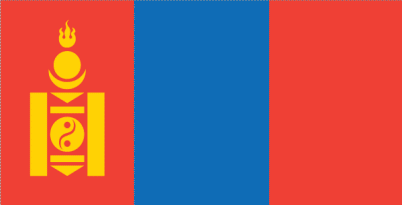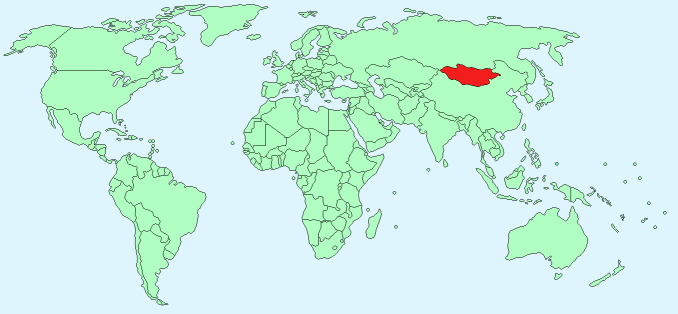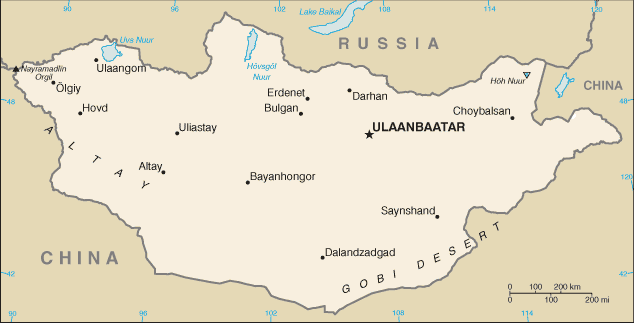Mongolia


Continent – Asia
Region – Northern Asia
Size – 1,564,116 km²
Geography – desert, semi desert and steppes
Language – Khalkha Mongo 90% (official), Turkic, Russian
Religion – Buddhist 53%, Muslim 3%, Christian 2.2%, Shamanist 2.9%, none 38.9%
Monetary Unit – Mongolian togrog
Natural Resources – oil, coal, copper, molybdenum, tungsten, phosphates, tin, nickel, zinc, fluorspar, gold, silver, iron
Agriculture – wheat, barley, vegetables, forage crops; sheep, goats, cattle, camels, horses
Industry – construction, mining for coal, copper, molybdenum, fluorspar, tin, tungsten, gold and oil; food; cashmere and natural fibre manufacturing

Neighbouring Countries – Russia, China
Population – 2,953,190 (2014 estimate)
Population Growth Rate – 1.37%
Average Life Expectancy – 68.98
Capital City – Ulaanbaatar (1,334,000)
Highest Mountain – Nayramadlin Orgil (4,374m)
Longest River – Orkhon (1,124 km)
Climate – continental – Short, hot summers 8°C to 25°C, long, cold winters – -28°C to 4°C
Yearly Rainfall – 30 cm (approx) mostly May to June
Plant Life – conifer, Siberian larch, Siberian cedar, pine, spruce, birch, aspen, poplar, grasses, rhododendrons, eidelweiss
Animal Life – grey wolf, Siberian ibex, Bactrian camel, snow leopard, wild horses, saiga antelope, musk deer, black-tailed gazelle, wild cat, wild boar, fox
Bird Life – hawks, falcons, buzzards, cranes, owls, golden eagle, spoonbill, pelican, egrets, swans, gulls
Fish Life – trout, sturgeon, roach, pike, perch, taimen
Harvard Reference for this page:
Heather Y Wheeler. (2015). Mongolia. Available: https://www.naturalhistoryonthenet.com/Facts_Figures/Country_Facts/mongolia.htm. Last accessed Tuesday, July 19, 2016
Facts and Figures Pages
